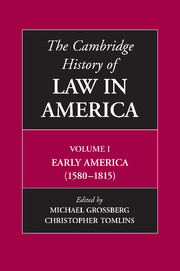Book contents
- Frontmatter
- 1 Law, Colonization, Legitimation, and the European Background
- 2 The Law of Native Americans, to 1815
- 3 English Settlement and Local Governance
- 4 Legal Communications and Imperial Governance: British North America and Spanish America Compared
- 5 Regionalism in Early American Law
- 6 Penality and the Colonial Project: Crime, Punishment, and the Regulation of Morals in Early America
- 7 Law, Population, Labor
- 8 The Fragmented Laws of Slavery in the Colonial and Revolutionary Eras
- 9 The Transformation of Domestic Law
- 10 Law and Religion in Colonial America
- 11 The Transformation of Law and Economy in Early America
- 12 Law and Commerce, 1580–1815
- 13 Law and the Origins of the American Revolution
- 14 Confederation and Constitution
- 15 The Consolidation of the Early Federal System, 1791–1812
- 16 Magistrates, Common Law Lawyers, Legislators: The Three Legal Systems of British America
- Bibliographic Essays
- Notes on Contributors
- Index
- References
7 - Law, Population, Labor
Published online by Cambridge University Press: 28 November 2008
- Frontmatter
- 1 Law, Colonization, Legitimation, and the European Background
- 2 The Law of Native Americans, to 1815
- 3 English Settlement and Local Governance
- 4 Legal Communications and Imperial Governance: British North America and Spanish America Compared
- 5 Regionalism in Early American Law
- 6 Penality and the Colonial Project: Crime, Punishment, and the Regulation of Morals in Early America
- 7 Law, Population, Labor
- 8 The Fragmented Laws of Slavery in the Colonial and Revolutionary Eras
- 9 The Transformation of Domestic Law
- 10 Law and Religion in Colonial America
- 11 The Transformation of Law and Economy in Early America
- 12 Law and Commerce, 1580–1815
- 13 Law and the Origins of the American Revolution
- 14 Confederation and Constitution
- 15 The Consolidation of the Early Federal System, 1791–1812
- 16 Magistrates, Common Law Lawyers, Legislators: The Three Legal Systems of British America
- Bibliographic Essays
- Notes on Contributors
- Index
- References
Summary
English colonizers mobilized immense resources to take possession of North America during the two centuries following their first intrusions in the late sixteenth century. None was more important than people. Nearly 200,000 were shipped across the Atlantic during the seventeenth century, nearly 600,000 during the eighteenth. Richard Hakluyt the elder – Middle Temple lawyer, Member of Parliament, confidant of statesmen, propagandist for colonizing – said it first and best. To “keepe” the country, it had to be planted – occupied and rendered productive. But planting required people. Hence the country had to be “man[ned].” English purposes rendered the existing indigenous population, to Hakluyt, “of small consideration.” The objective in colonizing North America was conquest and possession, not simply gain through commerce. “Manning,” that is, meant the introduction of alien populations not just as a reliable labor force to produce plantation commodities for European buyers, but also to establish the colonizer’s general dominion through physical occupation. Because population had such an unsurpassed strategic importance, the organization of manning requires our attention.
The demographic history of Anglophone America is characterized by great continuities. The first is the ubiquity of movements of population – indigenous, European, African, and (in the second half of the nineteenth century) Asian. The nation of immigrants is better denominated a nation of incessant migrations, whether transoceanic or intraregional, small or vast, voluntary or coerced. Second comes the equally ubiquitous phenomenon – among the newcomers – of rapid growth. During the first two centuries, for example, the introduced populations of the mainland British colonies grew from zero to 2.7 million.
- Type
- Chapter
- Information
- The Cambridge History of Law in America , pp. 211 - 252Publisher: Cambridge University PressPrint publication year: 2008
References
- 2
- Cited by



